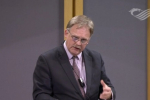
I’m pleased to support this consensual motion calling on the Welsh Government to produce a tackling poverty strategy, budget and action plan – and for this Welsh Parliament to drive accountability on progress made on the tackling poverty agenda.
Whereas UK Government policy applies on both sides of the border, Welsh Government policy only applies in Wales.
No doubt some speakers today will wish to give their take on policies made in Westminster, but this motion calls on us to focus on policies made in Wales.
If they choose to focus on UK Government Welfare Reform, I refer them to my 19th March speech on this here and to my 28th March speech at the Policy Forum for Wales Seminar on reducing poverty in Wales.
If they choose to focus on the UN Special Rapporteur’s Report on Extreme Poverty and Human Rights, I refer them to its section on Wales, which included:
- That Wales faces the highest relative poverty rate in the United Kingdom.
- That twenty-five per cent of jobs in Wales pay below minimum wage.
- And that although a poverty-specific action plan and the post of Minister for Communities and Tackling Poverty were scrapped in 2017, the Welsh Government’s new Prosperity for All Strategy “has no strategic focus or ministerial responsibility for poverty reduction, and lacks clear performance targets and progress indicators”.
The IFS report on “Living Standards, Poverty and Inequality in the UK: 2018” found:
- That between 2011 and 17, absolute poverty, after deducting housing costs, fell by 2½ percentage points to 19%.
- That growth in employment over this period caused absolute child poverty to fall by 3% to 26%, surpassing falls seen in the pre-recession period.
- That pensioners are still considerably less likely to be in poverty than other demographic groups after accounting for housing costs.
- And that relative poverty in the entire population has been broadly flat for the last 15 years and remains below the levels seen in the mid 1990s.
Although the ONS reported that income inequality had increased slightly last year, they said that this was a reversal of the trend seen in previous years and that “it may be too early to draw definite conclusions from this specific downtick”.
UN data puts the UK at 15th on the list of the happiest places to live.
AND in March, OECD figures showed that personal well-being levels have improved in the UK, as have mental health scores – increasing by 4.6% between 2011 and 2016 to 63.2%.
Only last month, however, research Commissioned by the End Child Poverty Network showed that Wales was the only UK Nation to see a rise in child poverty last year.
As the Children Commissioner for Wales said in March, “Welsh Government has a Child Poverty Strategy which outlines its long-term ambitions, but at the moment there’s no clear plan” and “Welsh Government should write a new Child Poverty Delivery Plan, focusing on concrete and measurable steps”.
Last October’s Equality and Human Rights Commission Report “Is Wales Fairer?” found, “poverty and deprivation still remain higher in Wales than other British nations; Wales is the least productive nation in the UK, and median weekly earnings in Wales are lower than in England and Scotland.”
As they stated, “we can make a difference, but this can only be achieved with both a bold vision and a deliverable action plan”.
February’s Bevan Foundation ‘State of Wales’ briefing on Low Pay found that both the number and percentage of workers paid below Real Living Wage in Wales has increased - with women, disabled people and BAME groups at heightened risk of being in low paid work.
The Bevan Foundation calls for the development of “an anti-poverty strategy that clearly sets the steps that the Welsh Government intend to take to reduce the number of people living in poverty in Wales”.
As Oxfam Cymru states “It’s not the case that anti-poverty strategies don’t work; it’s about how those strategies are targeted. The lack of a strategy denies the tackling poverty agenda a clear direction”.
And as NEA Cymu states “the Welsh Government should designate fuel poverty as an infrastructure priority”.
As I said in 2006 “all mainstream political parties want to tackle poverty. Social Justice will only be delivered by really empowering people to fulfil their potential and to take ownership in their own communities”.
Perhaps we should therefore revisit the 2013 statement by the Wales Council for Voluntary Action that “Welsh Government and the sector need to refresh current engagement mechanisms to develop, promote and monitor a ‘Programme for Action’ based upon co-production and common ground”?
